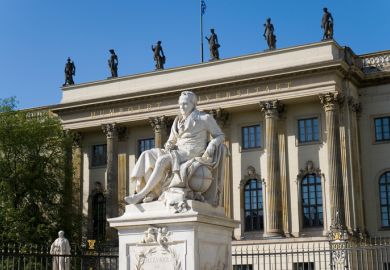European scholarly academies have warned that the Hungarian government is putting its scientific links with the rest of the continent at risk by meddling in the country’s universities.
The warning from All European Academies (Allea), which includes the UK’s Royal Society and France’s Academy of Sciences, follows news last week that the Hungarian government is planning to ban the teaching of gender studies.
A ban on the subject would be the latest move against academic independence in Hungary, where the government has sought to gain greater control over research funding and introduced legislation that could force Budapest’s Central European University to leave the country.
“As on previous occasions, through the ban of certain research subjects from academic curricula, the Hungarian government once again infringes on internationally applied and accepted principles of academic freedom, scientific excellence and the self-governance of scientific institutions,” Allea warns in a statement released on 21 August.
“Disregarding such fundamental principles undermines the traditionally excellent and internationally renowned Hungarian science base, and threatens its leading and pioneering role in the region,” it continues. “By its very actions, the Hungarian government politicises scientific research and jeopardises Hungary’s strong European and international partnerships in science.”
Hungarian academics have already warned that the government’s attempts to gain greater control of research spending could cut their access to European Union funding.
The Hungarian government has argued that teaching gender studies does not generate economic returns, although the CEU, one of just two institutions to offer the subject, is private and says that it does not receive state money.
But the move is also part of a broader ideological push. Speaking about the proposed ban, Gergely Gulyas, government chief of staff, said last week that “the Hungarian government is of the clear view that people are born either men or women”.
“They lead their lives the way they think best, but beyond this, the Hungarian state does not wish to spend public funds on education in this area,” according to Reuters.
Prime minister Victor Orban has long said that he rejects “liberal democracy”, and instead favours “Christian democracy” which upholds the “traditional family model.” The subject has come under attack from traditionalist politicians in Russia, Germany and Poland too.
The CEU has said that abolishing gender studies would “constitute a brutal interference in higher education to abolish an academic degree by a ministerial decree, without any consultation or serious analysis”.
Register to continue
Why register?
- Registration is free and only takes a moment
- Once registered, you can read 3 articles a month
- Sign up for our newsletter
Subscribe
Or subscribe for unlimited access to:
- Unlimited access to news, views, insights & reviews
- Digital editions
- Digital access to THE’s university and college rankings analysis
Already registered or a current subscriber?








